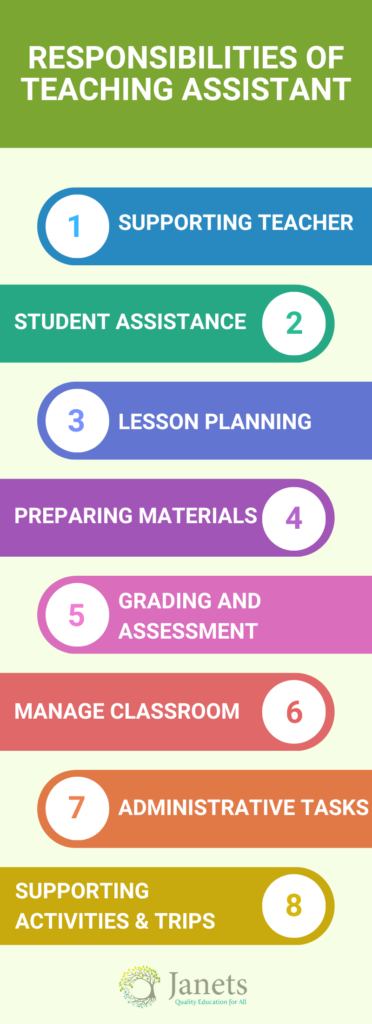- Home
- Teaching and Education
- How to Become a Teaching Assistant with no Experience in the UK
How to Become a Teaching Assistant with no Experience in the UK

If you are someone passionate about forming a career in the education sector, which is both satisfying and convenient, being a Teaching Assistant is what you are looking for. Traditional teaching jobs can be a time-consuming process too, but classroom support is in demand. Want to know more about how to become a teaching assistant with no experience in the UK?
Stay active with me and discover how to get in this profession and how this entire role works.
Have a look at some of the positive sides of the role:
- Positions are local
- Hours are flexible
- Roles are creative
What do Teaching Assistants do?
With the number of students and classes increasing, children must be guided and encouraged in the right way. So that they can reach their full capacity. That’s where teaching assistant skills and resources can come in effect. Everyday tasks of a teaching assistant may include:
- Helping children to read
- Supporting small groups in lessons
- Managing school trips and functions
- Preparing activities and learning materials
- Setting up displays and keeping classrooms tidy

You have to utilise the opportunity of getting involved in every phase of providing a lesson and make a notable difference. Witnessing children’s gradual progress makes this a worthwhile job.
Teaching Assistant duties depend on the level of TA qualification and their personal experiences. However, it also lies in the demands of individual schools. The role of the TA is full of variation flexibility.
Few key features of the job :
- Assisting the teacher with the delivery of the lesson.
- Supporting students with learning difficulties or disabilities
- Making the classroom ready for lessons
- Tidying up and keeping the classroom in good order
- Creating displays of pupils’ work
- Supporting on school trips or at school events
In general, the teaching assistant’s job is a rewarding one. You will never feel bored spending your time with a bunch of children guiding them through their learning curve. Another thing about becoming a TA is you will never run out of Aww moments. So you will always find reasons to become a teaching assistant.
What Qualifications do You Need to Become a Teaching Assistant?
There might be high competition for teaching assistant jobs. So making sure that you have the right qualifications on your CV is necessary. Any such official course for teaching assistants is not available, but employers do look for qualifications that are accredited.
Every particular school has different requirements for hiring ambitious teaching assistants. On top of that, they also prefer someone who likes working with children because that is very important. Here is a blog on SEN teaching strategies that will help you get familiar with some popular teaching strategies.

How can You be Successful in Interviews?
To be successful in an interview, you are required to showcase your goals and abilities. Looking up courses online, which might help you get ready for exams, in spare time, suggests a dedication to self-improvement and outstanding time and team management skills. Employers also look for people who are determined about what they do, and few online qualifications are a fantastic way to take an in-depth look at the education industry.
Here are some basic Teaching Assistant interview Questions that you may find useful.
How Important is Interacting With People in This Role?
Teaching assistants must have the capability of building and maintaining good relationships with parents, teachers and children. A placement in a local school may even lead you to a full-time job, so making everyone around happy is an easy task that can be portrayed.
Trying to know and understand other staff will help you to feel good for the day-to-day environment, which will put yourself in a great position when applying for a teaching assistant role.
Where are You most Likely to Get a TA Job?
Teaching assistants act as an influential part of the staff team in all primary, secondary and special schools for children. The role varies between the different types of schools:
- In a secondary school, you are more likely to concentrate on a subject or be assigned to guide a specific pupil with special needs, for example.
- You may have to carry out a more general role, working with a particular class frequently across all areas of the curriculum, if you work in a primary school.
- In a special school, you have to help a particular pupil or work regularly with a class being kind, generous and understanding towards them.

What Qualities make a Good Teaching Assistant?
Teaching assistants are a crucial element of educational institutes. TA’s provide direct support to both teachers and students, which makes others value them. Whilst every school can set their requirements for what they look for in a teaching assistant, and there are many admirable traits that all the good ones have.
Few traits that you should have to be a good TA even without experiences include:
1. Being Good with Children
That’s a kind of prerequisite which schools want you to have before joining as a TA. A great teaching assistant should understand how children learn and develop. Each child is different from another, so one should have the quality of having a child-centred approach, which means you’ll be able to adapt their style to the student.
2. Being Flexible and adaptable
While being flexible to offer a different approach to each child, teaching assistants also need to adapt to the flow of a teacher’s daily lesson. To be a great teaching assistant, you should be able to adapt to how the teacher provides the session and take a hold on it. So you have to be adaptable.
3. Have Solid Literacy and Numeracy Skills
As a teaching assistant, it is, of course, crucial that you have adequate knowledge of reading, writing and arithmetic. It is because you have to teach younger students correctly. In addition to knowing the process, a teaching assistant should also develop having communication skills to explain different topics nicely to the pupils. That’s what makes a teaching assistant better.

4. Have the Ability to Communicate Effectively
Communicating with students is essential, but there will also be times when they will provide feedback to parents and guardians. Building a good reputation with both students and parents is just as important.
5. Have Adequate Preparation
Teaching assistants should have the practice of planning things. Knowing in advance what will be taught that day or week offers an advantage to plan out how they may deliver their messages to the children during the lessons.
6. Able to Provide Effective Feedback
Teaching assistants are on the front-line of teaching young pupils. Therefore, you are working with children face to face and can spot if a child is falling behind or is absent-minded. Problems can be addressed quickly, whether it’s a child who is struggling with the pace or if one is excelling but is bored with the slow pace. Either way, you can provide this feedback to the teacher, and address any issue quickly.
How to Become a Teaching Assistant?
We don’t want to bore you with each and every step and provide details on how to become a teaching assistant in the UK. We will provide you the general gist:
Step 1 – Education and Skill Development:
Start by obtaining a high school diploma or equivalent. Enroll in relevant courses or pursue a degree in education, child development, or a related field. Focus on developing transferable skills like communication, patience, and organization through coursework or extracurricular activities.
Consider obtaining certifications like CPR or First Aid and gaining experience by volunteering with children or in educational settings.
Step 2 – Research and Volunteer Opportunities:
Explore volunteer opportunities in schools, community centers, or educational programs. Offer to assist teachers or educators during workshops, after-school programs, or summer camps. This hands-on experience will provide valuable insights into the role of a teaching assistant.
Network with teachers or educational professionals to express your interest in gaining experience and ask about potential volunteer openings.
Step 3 – Preparation of Application Materials:
Craft a resume highlighting relevant coursework, skills, and volunteer experiences. Emphasize transferable skills such as teamwork, communication, and adaptability. Tailor your cover letter to express your passion for education and your eagerness to learn and contribute.
Request recommendation letters from supervisors, mentors, or teachers who can attest to your abilities and work ethic.
Step 4 – Apply for Entry-Level Positions or Internships:
Search for entry-level teaching assistant positions or internships designed for candidates without prior experience. Look for opportunities at schools, educational programs, or community organizations.
Apply for these positions by following application instructions carefully and demonstrating your enthusiasm and willingness to learn.
Step 5 – Interview Preparation:
Prepare for interviews by researching the educational institution or program. Practice answering common interview questions, emphasizing your passion for education, adaptability, and willingness to contribute positively to the learning environment.
Highlight your transferable skills and relate any volunteer experiences to showcase your suitability for the role.
Step 6 – Ace the Interview:
During the interview, showcase your eagerness to learn, enthusiasm for working with students, and willingness to support teachers. Demonstrate your interpersonal skills and ability to collaborate effectively within a team.
Follow up with a thank-you note expressing gratitude for the opportunity to interview and reaffirming your interest in the position.
Step 7 – Onboarding and Learning:
If offered the role, embrace the opportunity to learn. Attend any training sessions or orientations provided by the institution. Familiarize yourself with classroom procedures, policies, and expectations.
This is what it pretty much looks like. But the main question remains – How to become a teaching assistant with no experience in the UK. This is exactly what we will decide right now!
How to Become a Teaching Assistant with No Experience?
Here is the step-by-step guideline on how to become a teaching assistant with no experience in the UK.
Completing a Course
Beginning a journey to become a teaching assistant without experience begins with education. Enroll in relevant courses that cover the fundamentals of education, child development, and classroom management. Many online platforms offer affordable courses, and completing them not only equips you with necessary knowledge but also demonstrates commitment to prospective employers.
Internship or Apprenticeship
Hands-on experience is invaluable. Seek internships or apprenticeships at local schools or educational institutions. This on-the-job training allows you to observe seasoned professionals, understand the dynamics of a classroom, and develop practical skills that a course may not fully capture. Such experiences enhance your resume and provide a real-world perspective on the role of a teaching assistant.
Sign Up for Volunteer Work
Volunteering is a powerful way to gain experience while giving back to the community. Offer your assistance at local schools, community centers, or after-school programs. Volunteering showcases your dedication and allows you to interact with students and teachers. It’s a chance to prove your passion for education and build connections that may lead to future opportunities.
Childcare Experience
Childcare experience is a valuable asset for a teaching assistant. Babysitting, tutoring, or working at daycare centers can provide insight into the needs of children and help you develop patience and effective communication skills. Highlight these experiences on your resume, emphasizing the transferable skills that make you a suitable candidate for a teaching assistant position.
Get Experience with Working in a Learning Environment
Broaden your experience by working in various learning environments. This could include community education programs, workshops, or online learning platforms. Diversifying your exposure showcases adaptability and a willingness to engage with different teaching methods. It also broadens your understanding of education beyond traditional classrooms.
Work in a Library
Libraries serve as hubs for learning and offer an environment conducive to education. Working in a library exposes you to diverse learning resources and provides a setting where you can interact with students and educators. This experience demonstrates your comfort in an academic atmosphere and your ability to assist others in their educational pursuits.
Apply for Jobs
Don’t hesitate to start applying for entry-level positions. Look for teaching assistant openings in schools, educational nonprofits, or community organizations. Tailor your resume to highlight relevant experiences and emphasize your eagerness to learn and contribute. Even if you don’t have direct teaching assistant experience, your transferable skills and passion for education can make a compelling case to potential employers.
Don’t Stress Out, It Is Not the End of the World!
Remember, the journey to becoming a teaching assistant is a process, and lack of initial experience doesn’t define your potential. Stay positive and persistent. Rejections are part of the job-seeking process, so view them as opportunities to learn and improve. Seek feedback, refine your approach, and continue building your skills. Your commitment and dedication will eventually open doors to rewarding opportunities in the education sector. Patience and resilience are key virtues on this career path.
Teaching Assistant Salary
For full-time, permanent TA’s, the typical starting salary is roughly £20,000. With more responsibility and experience, you can expect to earn £23,000 to £25,000 or more. Level 3 teaching assistants can earn up to £30,000 per year or more. And higher-level teaching assistants with extra specialisations or SEN responsibilities can make more than that.
Consequently, the majority of schools adhere to local government compensation recommendations for teaching assistants. However, it is not an absolute norm. The Department for Education in the United Kingdom does not set the pay scale for TA’s on a national level.
As a result, your payments may vary based on the type of employer. Due to different financial cuts, state-funded schools frequently pay a lower wage. Many private schools, on the other hand, may pay a generous annual income. Additionally, keep a lookout for additional employee advantages when working at a private school!
In essence, your pay as a teaching assistant will be determined by your function. Moreover, the nature of your job responsibilities and educational setting has to be factored in. The income may be better if you work for an educational recruiting firm. Because many of them are seeking people with experience and qualifications.
Criminal Record Check
To become a teaching assistant, you must first understand what a DBS check is. Before your employer gives you the go-ahead to start working, a DBS check will be performed. The Disclosure and Barring Service is in charge of this. They check to see if a specific person has a criminal past.
The DBS check happens before you start working with vulnerable age groups. The age group includes children and the elderly. You must pass the background check to start working. You will be subjected to a background check by either your school or your employer.
Consequently, you may be asked to show proof of police clearance. If your documentation is in order, you can begin working immediately.
Bottom Line
Different schools set their entry requirements and decide which qualifications and experience they want. Some institutions may prefer previous qualifications in nursery work, childcare, playwork or youth work.
But even if you don’t have enough experience of working with children, don’t worry at all! You can show employers that you have the right personality and potential to motivate them to recruit you and train you on the job. However, volunteering in a local school for a few hours a week is an excellent way to start.
Don’t hesitate to become a teaching assistant if you don’t have any experience. As you have read, you can be one with other positive traits as well.





 LOGIN/Sign up
LOGIN/Sign up


